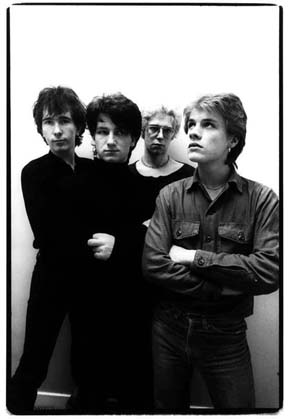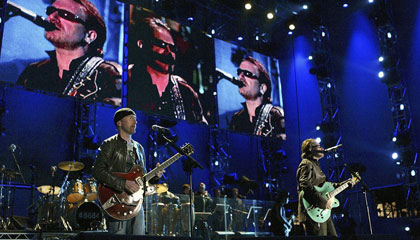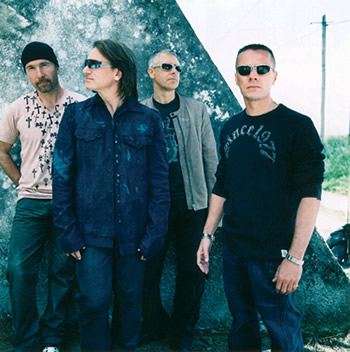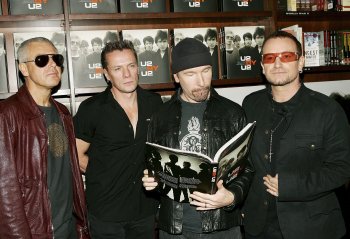| B i o g r a p h y |
 In autumn 1976, drummer Larry Mullen put a note on the
notice board at Mount Temple Comprehensive School in Dublin, looking
for people to join a band. Paul Hewson
(aka Bono Vox), Dave Evans (aka The Edge), Dik Evans, and Adam Clayton
joined up. Dik soon left to join the Virgin Prunes, while the remaining
four formed 'Feedback' before changing to 'The Hype' and then U2.
In autumn 1976, drummer Larry Mullen put a note on the
notice board at Mount Temple Comprehensive School in Dublin, looking
for people to join a band. Paul Hewson
(aka Bono Vox), Dave Evans (aka The Edge), Dik Evans, and Adam Clayton
joined up. Dik soon left to join the Virgin Prunes, while the remaining
four formed 'Feedback' before changing to 'The Hype' and then U2.
The band's first break was winning £500 in a talent contest on St. Patrick's Day (March 17th) in Limerick. Bono later recalled that they had beaten off many technically better bands because of what he called 'a spark', which had produced a great atmosphere on stage. One of the judges that week was Jackie Heyden of CBS Records, who was impressed and arranged their first demo session. It was not a great success due to the band's inexperience and lack of studio time - but itwas a start.
Their reputation for electrifying live shows meant that U2 soon built up a dedicated fan base. Bill Graham, a journalist with 'Hot Press', was an early champion of the band and introduced them to their manager, Paul McGuinness. A three year contract with CBS Ireland soon followed, and with it the release of their first record in September 1979 - a three song EP entitled 'U23' comprising 'Out of Control', 'Boy/Girl', and 'Stories for Boys'. A second single followed, before the band signed a worldwide contract with Island Records in March 1980.
Boy Having secured a record deal, the rest of 1980 was spent touring extensively. Despite this, the band also found time to record their first LP, 'Boy', which received widespread critical acclaim on its release in October. A year later came 'October' a much more mellow and spiritual record that reflected the Christian beliefs of Bono, Edge and Larry, and built on the success of 'Boy'.
U2 hit the big time with the 'War' LP, released in March 1983. Boosted by the success of the 'New Year's Day' single, the record entered the UK charts at Number 1, and established the band as a mainstream act. Further US and European tours followed, where the songs for the mini Live LP ' Under A Blood Red Sky' were recorded. This record marked the end of an era, as it was the last record before brian Eno and Daniel Lanois were engaged to work on future LPs.
The next record to be released, 'The Unforgettable Fire', was much more complex style than the 'anthems' of the War era. Despite a few teething problems incorporating the newer songs into the band's live set, the material was well received on the subsequent European and US tours. The mini LP ' Wide Awake in America' was comprised of 2 new tracks and 2 live recordings from the European tour. It was at this time, in April 1985, that 'Rolling Stone' magazine dubbed U2 "The Band of The Eighties".
 That
summer U2 played the Live Aid concert at Wembley Stadium in London,
where they gave a memorable performance, as the song 'Bad' over-ran to
about 12 minutes! Bono actually considered leaving the band at that
point, as he feared that his antics during that show (dancing with
girls from the audience while leaving the band to play on regardless)
had ruined the set for the rest of the band - Pride had to be dropped
from the set due to lack of time. Only when a friend told him that it
was one of the high points of the day did he come round. The following
year U2 played Self Aid, a benefit for Ireland's unemployed, and joined
the Conspiracy of Hope tour for Amnesty International.
That
summer U2 played the Live Aid concert at Wembley Stadium in London,
where they gave a memorable performance, as the song 'Bad' over-ran to
about 12 minutes! Bono actually considered leaving the band at that
point, as he feared that his antics during that show (dancing with
girls from the audience while leaving the band to play on regardless)
had ruined the set for the rest of the band - Pride had to be dropped
from the set due to lack of time. Only when a friend told him that it
was one of the high points of the day did he come round. The following
year U2 played Self Aid, a benefit for Ireland's unemployed, and joined
the Conspiracy of Hope tour for Amnesty International.
The Joshua TreeU2's 7th LP was 'The Joshua Tree', another Eno/Lanois collaboration which was released in March 1987. This was to be their most successful record to date, becoming the fastest selling record ever in the UK on its release, and reaching number one in 22 countries. The accompanying tour included over 100 shows, and cemented their reputation as what 'Time' magazine called "Rock's hottest ticket". On the 3rd leg, U2 even opened some of their own shows as a country and western band known as The Dalton Brothers. During the tour, director Phil Joanou was chosen to put together a film which would capture the live shows, and also depict the band's perceptions of America. Filmed chiefly in Denver, Colorado and Tempe, Arizona, the resulting movie ('Rattle and Hum') and the LP of the same name were released in October 1988. Taken from this LP, the single 'Desire' gave U2 their first UK mumber one single. Other songs on the record, such as 'When Love Comes to Town', featured blues legend BB King, and he joined U2 on the Love Town tour which concentrated on Australia, New Zealand and Japan.
 At
the end of the 1980s, U2 played a series of 4 concerts at The Point
Depot in Dublin, culminating with a show on New Year's Eve which was
broadcast throughout the world. Bono announced on stage that it was
"time to go away and dream it all up again". Some feared that U2 were
splitting up, but those fears proved to be unfounded with the release
of 'Achtung Baby' in November 1991. A much more electronically
processed record than their earlier releases, it marked a new beginning
in U2's career. The subsequent ZooTV tour was a huge extravaganza which
used giant video screens to create a stunning visual spectacle, and at
the end of each show of the tour Bono attempted to call VIPs such as
Bill Clinton, Pavarotti, or Princess Diana.
At
the end of the 1980s, U2 played a series of 4 concerts at The Point
Depot in Dublin, culminating with a show on New Year's Eve which was
broadcast throughout the world. Bono announced on stage that it was
"time to go away and dream it all up again". Some feared that U2 were
splitting up, but those fears proved to be unfounded with the release
of 'Achtung Baby' in November 1991. A much more electronically
processed record than their earlier releases, it marked a new beginning
in U2's career. The subsequent ZooTV tour was a huge extravaganza which
used giant video screens to create a stunning visual spectacle, and at
the end of each show of the tour Bono attempted to call VIPs such as
Bill Clinton, Pavarotti, or Princess Diana.
ZooropaOn a break from the tour, U2 recorded 'Zoooropa' which was released in July 1993. Less commercially successful than previous releases, it was U2's most experimental work to date. It was to be 4 years before their next LP was released, although they continued working on various outside projects, such as the soundtrack for Batman Forever which yielded the single 'Hold Me, Thrill Me, Kiss Me, Kill Me'. Larry and Adam worked on the 'Mission Impossible' soundtrack, while Bono and Edge worked on 'Goldeneye'. U2 also donated songs to good causes such as the AIDS fundraiser 'Red, Hot and Blue' and 'A Very Special Christmas'.
In March 1997 U2 released 'Pop' which Edge described as being "about as far away from U2 as it is possible to be". Yet another massive world tour followed, which utilised the world's largest video screen at 150 feet wide and 50 feet tall to show live pictures of the band performing, along with computer generated animation sequences. Other props included a giant rotating lemon shaped mirrorball (from which the band would emerge for the encores) and a huge olive on a 100 foot high cocktail stick. According to recent reports, this was to be the last tour of such proportions that the band would undertake.
A new LP entitled 'All That You Can't Leave Behind' was released on the 30th October 2000 (31st in the US). In a recent interview, manager Paul McGuinness stated that because of the high price of CDs in the UK and Ireland and because U2's earliest fans came from those countries, there would be a bonus track (The Ground Beneath Her Feet) on the UK release of the album. The new LP reached number one in the British album charts in its first week of release but did not manage this feat in the America, where sales were not quite what many had hoped.
 In
support of All That You Can't Leave Behind, the Elevation tour started
in Florida in March 2001 and covered North America, Europe and then
back to the US and Canada, where the shows seemed to take on a new
meaning in the wake of September 11th. Sadly, Australasia and South
America missed out on the tour for economic reasons. The weakness of
the currencies in those regions meant that a tour was not financially
viable. On 3rd Feb 2002 the band appeared at the halftime show of
Superbowl XXXVI where they performed Beautiful Day, MLK and Where the
Streets Have No Name to the backdrop of a touching tribute to the
victims of Sptember 11th.
In
support of All That You Can't Leave Behind, the Elevation tour started
in Florida in March 2001 and covered North America, Europe and then
back to the US and Canada, where the shows seemed to take on a new
meaning in the wake of September 11th. Sadly, Australasia and South
America missed out on the tour for economic reasons. The weakness of
the currencies in those regions meant that a tour was not financially
viable. On 3rd Feb 2002 the band appeared at the halftime show of
Superbowl XXXVI where they performed Beautiful Day, MLK and Where the
Streets Have No Name to the backdrop of a touching tribute to the
victims of Sptember 11th.
A second Best Of CD was released in November 2002, which included The Hands That Built America from the soundtrack to The Gangs of New York, which was nominated for an Oscar in March 2003. Another new album, 'How to Dismantle an Atomic Bomb'was released in November 2004 with its first single named 'Vertigo' being released in September. The band hit the headlines in July 2004 when Edge's CD demo of the new album was stolen in the south of France. Despite a detailed investigation by French police, it has yet to be found.
The Vertigo tour kicked off in San Diego, California at the end of March 2005. It has been widely speculated that the tour was delayed for a month due to the health problems of a family member of one of the band and Bono later said onstage that the tour might not have happened at all but for some people who did everything they could to save it. A European leg followed during the summer before a return to North America in September. Australian and Japanese dates are expected to be confirmed for the early part of 2006.